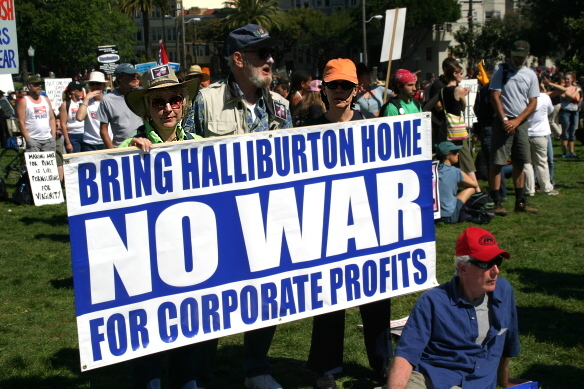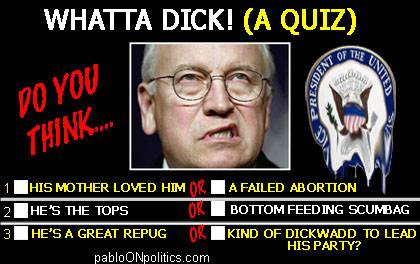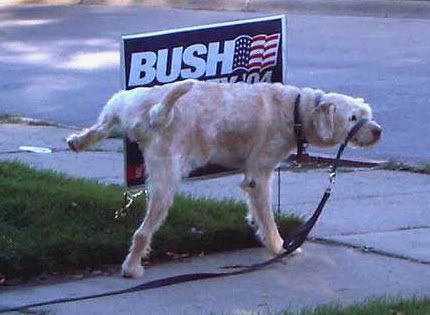Dick Cheney- Corporate Criminal |
|
 Details the myriad illegal, immoral, and unethical activities of Dick Cheney when CEO of Halliburton, his obstruction of justice, and lies to the American public since his appointment as Vice President.
For information on an equally corrupt politician, see link to Tom DeLay-Corporate Whore.
Be sure to visit our cavernous vault of archives.
Details the myriad illegal, immoral, and unethical activities of Dick Cheney when CEO of Halliburton, his obstruction of justice, and lies to the American public since his appointment as Vice President.
For information on an equally corrupt politician, see link to Tom DeLay-Corporate Whore.
Be sure to visit our cavernous vault of archives.Cost of the War in Iraq
(JavaScript Error)
|
 Halliburton's Iraq deals described as contract abuse Jun 27, 10:11 PM (ET) By Sue Pleming WASHINGTON (Reuters) - A top U.S. Army procurement official said on Monday Halliburton's deals in Iraq were the worst example of contract abuse she had seen as Pentagon auditors flagged over $1 billion of potential overcharges by the Texas-based firm. Bunny Greenhouse, the Army Corps of Engineers' top contracting official-turned whistle-blower, said in testimony at a hearing by Democrats on Capitol Hill that "every aspect" of Halliburton's oil contract in Iraq had been under the control of the Office of the Secretary of Defense. "I can unequivocally state that the abuse related to contracts awarded to KBR (Kellogg Brown and Root) represents the most blatant and improper contract abuse I have witnessed during the course of my professional career," said Greenhouse, a procurement veteran of more than 20 years. Her blistering criticism came as Democrats released a new report including Pentagon audits that identified more than $1.03 billion in "questioned" costs and $422 million in "unsupported" costs for Halliburton's work in Iraq. Defense Department spokeswoman Lt. Col Rose-Ann Lynch said the Pentagon had received the report but had not had a chance yet to fully review it. "The department is committed to an integrated, well-managed contracting process in Iraq," said Lynch, adding that just because costs were questioned by auditors this did not mean a company had overcharged the military. Halliburton's subsidiary KBR is the U.S. military's biggest contractor in Iraq and has been accused by Democrats of getting lucrative work there because of its ties to Vice President Dick Cheney who headed Halliburton company from 1995-2000. Pressed by lawmakers whether she thought the defense secretary's office was involved in the handout and running of contracts to KBR, Greenhouse replied: "That is true." "I observed, first hand, that essentially every aspect of the RIO (Restore Iraqi Oil) contract remained under the control of the Office of the Secretary of Defense. This troubled me and was wrong," said Greenhouse. Halliburton issued a statement strongly rejecting comments by Greenhouse and others at the hearing, including a former KBR employee who accused the company of overcharging for food services provided to troops under a logistics deal. "The only thing that's been inflated is the political rhetoric which is mostly a rehash of last year's elections," spokeswoman Cathy Mann said of the hearing. HALLIBURTON DEFENDS ITSELF Regarding claims of political influence because of Cheney, Mann said it was easier to "assign devious motives than to take the time to learn the truth." Both the Pentagon and the Corps, which was in charge of a sole-source oil contract given to KBR in Iraq, have denied any special treatment for KBR. The Corps did not immediately respond to questions. Democrats called for an urgent hearing and an investigation into what they called contracting abuses involving KBR. "This testimony doesn't just call for Congressional oversight -- it screams for it," said Sen. Byron Dorgan, a Democrat from North Dakota. What concerned Greenhouse most was that the oil contract, which had a top value of $7 billion, was given to KBR without competitive bidding. She irked her bosses by writing her concerns by hand in official documents but said these were overlooked. In one instance, she said Army Corps officials bypassed getting her signature to grant a waiver for KBR to be relieved of its obligation to provide cost and pricing data for bringing fuel into Iraq. That waiver was granted after a draft Army audit said KBR may have overcharged the military by at least $61 million to bring in fuel to Iraq to ease a shortage of refined oil. Greenhouse acknowledged she had become a thorn in the side of the Army Corps and said she had been advised not to attend the hearing because of its partisan nature. Rory Mayberry, a former food production manager at a U.S. military base for KBR from February-April 2004, said the company charged for meals it did not serve to troops and had dished up spoiled food. KBR's Mann dismissed his taped testimony and said issues regarding billing over food services had been resolved.  Army awards Balkans contract to Halliburton despite FBI probe 21 June 2005 WASHINGTON, June 21 (HalliburtonWatch.org) -- The U.S. Army on Tuesday awarded Halliburton a troop logistics contract for the Balkans despite an ongoing federal criminal probe into the legality of the company's existing Balkans contracts. The Federal Bureau of Investigation (FBI) opened a probe last year into allegations by Bunnatine Greenhouse, a senior contracting specialist with the Army, who said Halliburton's troop logistics work in the Balkans was "out of control." The Army opened an investigation into her allegations last year. Halliburton's KBR subsidiary, also known as Kellogg Brown & Root, is responsible for carrying out the Army's troop logistics work in the Balkans and elsewhere. The nonpartisan auditing arm of Congress found in 1997 that KBR billed the Army for questionable expenses for work in the Balkans, including charges of $85.98 per sheet of plywood that cost $14.06. A follow-up report in 2000 found more inflated costs, including charges for cleaning offices up to four times a day. Greenhouse said Army officials ignored these concerns when it renewed Halliburton's Balkans contract for another five years in 1999. She also said Tina Ballard, deputy assistant Army secretary for policy and procurement, was telephoned during a meeting and ordered to renew the contract for "political reasons." The FBI is also investigating Greenhouse's allegation that the Army altered documents in order to legitimate Halliburton's contract work in the Balkans. Greenhouse's attorney, Michael Kohn, is calling for an independent organization, outside of the Pentagon, to investigate charges of cronyism regarding Halliburton's contracts. "This needs to be done by an outside agency," he told the Associated Press last year. "From past experience, we are uncomfortable with the DOD-IG (the Pentagon's inspector general) handling this investigation by themselves." Kohn's concerns may be justified since a report from Rep. Henry Waxman (D-CA) found that President Bush has repeatedly appointed individuals with Republican political backgrounds to serve as nonpartisan inspectors general at federal departments and agencies. Halliburton's new Balkans contract will last for up to five years and is valued at $1.25 billion.  Halliburton bribes: 'most significant file of corruption' in Washington, says US official 20 June 2005 WASHINGTON, June 20 (HalliburtonWatch.org) -- A U.S. Justice Department official held "lengthy" meetings with French authorities in Paris last week to discuss a potentially explosive bribery investigation involving Halliburton, the French newspaper Le Figaro reported today. The alleged bribes were paid by a consortium of four companies, which includes Halliburton's KBR subsidiary, to officials of the Nigerian government for the purpose of winning a multibillion dollar construction contract. The consortium, known as "TSKJ," ultimately won the contract. U.S. Vice President Dick Cheney was Halliburton's CEO when many of the alleged bribes were paid. He currently has not been accused of any wrongdoing. Bribing foreign officials is a criminal offense under the U.S. Foreign Corrupt Practices Act. In 2003, French Judge Renaud Van Ruymbeke initiated an investigation after discovering $130 million in suspicious payments made to Nigerian officials from 1995 through 2002. The French company Technip is a member of the TSKJ consortium, along with KBR, Italy's Snamprogetti and Japan Gasoline Corp. The U.S. Justice Department and the Securities and Exchange Commission have been investigating the matter for over a year. Investigators say some of the bribe money was found in the bank account of KBR chief Albert Jack Stanley, who was later fired by Halliburton on grounds that he accepted "improper personal benefits" related to the Nigeria contract. Last year, Halliburton's lawyer James Doty found incriminating company documents which, he says, show "people may at the time have been planning or contemplating the necessity of money for the purpose of making bribes." In the United States, the scandal has been confined mostly to the business press, but Le Figaro reported an unnamed U.S. source who said it is "probably the most significant file of corruption" known in Washington.  How Cheney Fooled Himself By E. J. Dionne Jr. Tuesday, June 21, 2005; Page A21 President Bush planted the seeds of the destruction of his Iraq policy before the war started. Salvaging the venture will require an unprecedented degree of candor and realism from a White House that was never willing to admit -- even to itself -- how large an undertaking it was asking the American people to buy into. The notion that the president led the country into war through indirection or dishonesty is not the most damaging criticism of the administration. The worst possibility is that the president and his advisers believed their own propaganda. They did not prepare the American people for an arduous struggle because they honestly didn't expect one. How else to explain the fact that the president and his lieutenants consistently played down the costs of the endeavor, the number of troops required, the difficulties of overcoming tensions among the Sunnis, the Shiites and the Kurds? Were they lying? The more logical explanation is that they didn't know what they were talking about. Because the White House failed to prepare Americans for what was to come, the administration now faces a backlash. Over the weekend Bush said that the terrorists in Iraq were seeking to "weaken our nation's resolve." But the rising impatience about which Bush complains is a direct result of the administration's blithe dismissal of those who warned just how tough the going could get. The assertion of the "Downing Street Memo" that "the intelligence and facts were being fixed around the policy" of invasion has understandably become a rallying point for the war's opponents. But in some ways more devastating are other recently disclosed documents in which British officials warned that "there was little discussion in Washington of the aftermath after military action." The British worried at the time that "U.S. military plans are virtually silent" on the fact that "a postwar occupation of Iraq could lead to a protracted and costly nation-building exercise." The most damaging document supporting this claim is not secret, and remains one of the most important artifacts of the prewar debate. It is the transcript of "Meet the Press" from March 16, 2003, in which Vice President Cheney gave voice to the administration's optimistic assumptions that have now been laid low by reality. Host Tim Russert asked whether "we would have to have several hundred thousand troops there" in Iraq "for several years in order to maintain stability." Cheney replied: "I disagree." He wouldn't say how many troops were needed, but he added that "to suggest that we need several hundred thousand troops there after military operations cease, after the conflict ends, I don't think is accurate. I think that's an overstatement." Russert asked: "If your analysis is not correct, and we're not treated as liberators but as conquerors, and the Iraqis begin to resist, particularly in Baghdad, do you think the American people are prepared for a long, costly, and bloody battle with significant American casualties?" Cheney would have none of it. "Well, I don't think it's likely to unfold that way, Tim, because I really do believe that we will be greeted as liberators. I've talked with a lot of Iraqis in the last several months myself, had them to the White House. . . . The read we get on the people of Iraq is there is no question but what they want [is to] get rid of Saddam Hussein and they will welcome as liberators the United States when we come to do that." Russert: "And you are convinced the Kurds, the Sunnis, the Shiites will come together in a democracy?" Cheney: "They have so far." And the vice president concluded: "I think the prospects of being able to achieve this kind of success, if you will, from a political standpoint, are probably better than they would be for virtually any other country and under similar circumstances in that part of the world." Was Cheney disguising the war's costs for political purposes? It's more likely that he believed every word he said. That suggests that the administration was not misleading the American people nearly so much as it was misleading itself. Republican Sen. Chuck Hagel of Nebraska says in the current issue of U.S. News & World Report that "the White House is completely disconnected from reality" and that "it's like they're just making it up as they go along." Unfortunately, the evidence of the past suggests that Hagel's acerbic formulation may be exactly right. Those who still see the invasion of Iraq as a noble mission don't need to protect the policy from the war's critics. They need to rescue it from its architects.  Jackson's story might be over, but Dean saga goes on June 19, 2005 BY WILLIAM O'ROURKE Alas, the media -- especially cable TV "news" -- doesn't have Michael Jackson to kick around anymore, but luckily they do have Democratic National Committee Chairman Howard Dean to pick on. Once the Jackson "not guilty" verdicts came in, the Jackson media bubble burst. Had he been found guilty, there would have been weeks of TV analysis, book deals galore, the rehashing of salacious stories and, given the protection of a guilty verdict, the rumor boil could be lanced and even more sordid tales would spill out. But, "Not Guilty" stops the flood: No one wants to read libel-leery, tip-toeing accounts of the trial, or watch hourlong television retrospectives. No small industry of pedophile experts will rise up, no "Jacko in Jail" continuing coverage will commence. But, unlike Jackson, the Dean story will continue and, though the audience for it is far smaller, those who care are just as passionate as Jackson's fans and detractors. Both Dean and Jackson attract notice for show-biz reasons. Dean became the rock star phenom of the 2004 election. Vice President Dick Cheney might find Dean's allure mysterious -- he told Fox News' Sean Hannity that other than Dean's mother, no one Cheney has met loves Howard Dean -- but anyone in the entertainment world can see Dean's appeal. He's the guy with a garage band who made it big, the grunge politician who flamed out spectacularly and then picked himself up, dusted himself off and reclaimed the public spotlight. Jackson, though his career is longer, has had his ups and downs too. His court victory is both an up and a down. The jury found too much reasonable doubt to convict him -- and that was about its only show of reason. Juries in the prominent cases of late appear to decide guilt or innocence based on their feelings about the victims. California juries liked Laci Peterson more than Scott; they liked Robert Blake more than they liked his slain wife, and ditto for O.J. Simpson. Jackson's jury of peers liked the king of pop more than they liked the accuser and his mother. The child paid for her sins. And Jackson was their neighbor. They shared the defense view: the mother and her children were grifters who should be run out of town. When the entire jury and the four alternates assembled for a post-verdict news conference, they tried to watch what they said, but they didn't seem to realize they were being watched by millions. One woman juror couldn't stop rolling her eyes when she refused to discuss the mother of the accuser. When pressed for her thoughts about a man in his 40s sleeping with young boys, Juror No. 10 said, "What mother in her right mind would allow that to happen? Just freely volunteer your child to sleep with someone." But her horror stopped with the accuser's mother and did not carry over to the man who brought about the arrangement. Meanwhile, Dean is slapped around by Republicans -- and Democrats -- for every alleged outrageous remark he utters. Part of the so-called Democratic leadership, Senators Biden, Lieberman and Feinstein, Rep. Nancy Pelosi, and the failed VP candidate, John Edwards, claimed Dean didn't speak for them. But there is no single Democratic leader, there is a handful, Dean being one. He spoke for disaffected Dems, the Deaniacs, when he said: "I hate Republicans and everything they stand for," followed later by "They're a pretty monolithic party -- they all behave the same, they all look the same, and they all -- you know, it's pretty much a white, Christian party." After complaints surfaced, Dean responded, "I don't hate Republicans, but I sure hate what this Republican party is doing to America." Through his lawyer, Jackson says he will no longer invite young boys into his bed. And Dean vows to stay in his post and refuses to curb his Republican pleasing, bad-quote-producing pronouncements. Time will tell which one breaks his promise first.  Good Dog Dick Cheney's track record by kos Wed Jun 1st, 2005 at 20:32:28 PDT As noted earlier, Cheney recently said this: The insurgency in Iraq is "in the last throes," Vice President Dick Cheney says, and he predicts that the fighting will end before the Bush administration leaves office. In a wide-ranging interview Monday on CNN's "Larry King Live," Cheney cited the recent push by Iraqi forces to crack down on insurgent activity in Baghdad and reports that the most-wanted terrorist leader, Abu Musab al-Zarqawi, had been wounded. The vice president said he expected the war would end during President Bush's second term, which ends in 2009. Last time he ventured a prediction? It was October 28, 2004: They [insurgents] will do everything they can to disrupt the process up to those elections in January because they know that once you've got a democratically elected government in place that has legitimacy in the eyes of the people of Iraq, they're out of business. That will be the end of the insurgency. Yeah, that one didn't quite pan out, did it. The big question is whether they believe their own propaganda, or whether it's there to keep their lemmings satiated. |